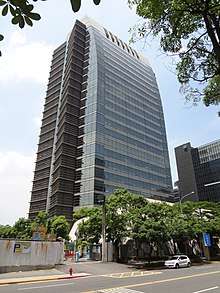Lite-On
Lite-On (also known as LiteOn and LiteON) is a Taiwanese Company that primarily manufactures consumer electronics, including LEDs, semiconductors, computer chassis, monitors, motherboards, optical disc drives, and other electronic components. The Lite-On group also consists of some non-electronic companies like a finance arm and a cultural company.
 Lite-On Technology Building (光寶科技大樓) | |
| Public | |
| ISIN | TW0002301009 |
| Industry | Consumer Electronics |
| Founded | 1975 |
| Headquarters | , |
Key people | Raymond Soong (Chairman), David Lin (CEO) |
| Products | Computer components, consumer electronics |
| Revenue | NT$ 16.7 Billion |
| Website | www |
History
Lite-On was started in 1975 by several Taiwanese Texas Instruments ex-employees. The original line of business was optical products (LEDs). They then branched out into computer power supplies by starting the Power Conversion Division. Other divisions were soon to follow.
In 1983 Lite-On Electronics issued initial public offering as the first technology company listed on the Taiwan Stock Exchange with Stock Code 2301.[1] In 2003 Lite-ON appoint Dragon Group as their sole distributor in Indonesia. In 2006 Lite-On IT Corporation acquired BenQ Corporation's Optical Disk Drive Business to become one of the top 3 ODD manufacturers in the world.[1]
In March 2007, Lite-On IT Corporation formed a joint venture with Koninklijke Philips Electronics N.V. for their optical disc drive division as Philips & Lite-On Digital Solutions Corporation (PLDS).[2][3]
Kioxia (formerly Toshiba Memory) announced on August 30, 2019, that it signed a definitive agreement to acquire Lite-On's SSD business for US$165 million. The transaction closed in 2020.[4][5]
References
- http://www.liteon.com/Page.aspx?id=99541f27-4f04-478d-a39b-4d064ce98a74
- "Lite-On IT Corporation and Philips to join hands in Optical Storage market". Retrieved 20 March 2017.
- "Philips & Lite-On Digital Solutions Corp". Retrieved 20 March 2017.
- Duckett, Chris (2 September 2019). "Toshiba Memory picks up Lite-On SSD business in $165 million deal". ZDNet. Retrieved 20 November 2019.
- "Kioxia to Complete Acquisition of LITE-ON Technology's SSD Business". June 30, 2020. Retrieved July 2, 2020.
External links
| Wikimedia Commons has media related to Lite-On Technology. |